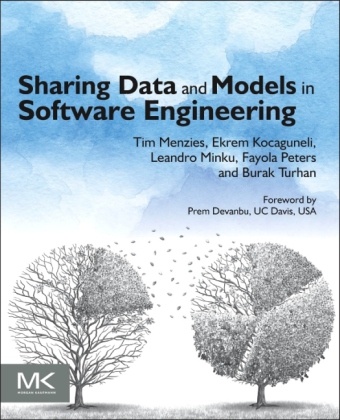Ulteriori informazioni
Informationen zum Autor Tim Menzies, Full Professor, CS, NC State and a former software research chair at NASA. He has published 200+ publications, many in the area of software analytics. He is an editorial board member (1) IEEE Trans on SE; (2) Automated Software Engineering journal; (3) Empirical Software Engineering Journal. His research includes artificial intelligence, data mining and search-based software engineering. He is best known for his work on the PROMISE open source repository of data for reusable software engineering experiments. Ekrem Kocaguneli received his Ph.D. from the Lane Department of Computer Science and Electrical Engineering, West Virginia University. His research focuses on empirical software engineering, data/model problems associated with software estimation and tackling them with smarter machine learning algorithms. Burak Turhan is a Professor of Software Engineering, University of Oulu, Finland. His research interests include empirical studies of software engineering on software quality, defect prediction, and cost estimation, as well as data mining for software engineering. Leandro L. Minku is a Research Fellow II at the Centre of Excellence for Research in Computational Intelligence and Applications (CERCIA), School of Computer Science, the University of Birmingham (UK). His research focuses on software prediction models, and he is the co-author of the first approach able to improve the performance of software predictors based on cross-company data over single-company data by taking into account the changeability of software prediction tasks' environments. Fayola Peters is a PostDoctoral Researcher at LERO, the Irish Software Engineering Research Center, University of Limerick, Ireland. Along with Mark Grechanik, she is the author of one of the two known algorithms (presented at ICSE’12) that can privatize algorithms while still preserving the data mining properties of that data. Klappentext Data Science for Software Engineering: Sharing Data and Models presents guidance and procedures for reusing data and models between projects to produce results that are useful and relevant. Starting with a background section of practical lessons and warnings for beginner data scientists for software engineering, this edited volume proceeds to identify critical questions of contemporary software engineering related to data and models. Learn how to adapt data from other organizations to local problems, mine privatized data, prune spurious information, simplify complex results, how to update models for new platforms, and more. Chapters share largely applicable experimental results discussed with the blend of practitioner focused domain expertise, with commentary that highlights the methods that are most useful, and applicable to the widest range of projects. Each chapter is written by a prominent expert and offers a state-of-the-art solution to an identified problem facing data scientists in software engineering. Throughout, the editors share best practices collected from their experience training software engineering students and practitioners to master data science, and highlight the methods that are most useful, and applicable to the widest range of projects. Inhaltsverzeichnis Introduction Data Science 101 Cross company data: Friend or Foe? Pruning: Relevancy is the Removal of Irrelevancy Easy Path: Smarter Design Instance Weighting: How not to elaborate on analogies Privacy: Data in Disguise Stability: How to find a silver-bullet model? Complexity: How to ensemble multiple models?...
Sommario
- Introduction
- Data Science 101
- Cross company data: Friend or Foe?
- Pruning: Relevancy is the Removal of Irrelevancy
- Easy Path: Smarter Design
- Instance Weighting: How not to elaborate on analogies
- Privacy: Data in Disguise
- Stability: How to find a silver-bullet model?
- Complexity: How to ensemble multiple models?

